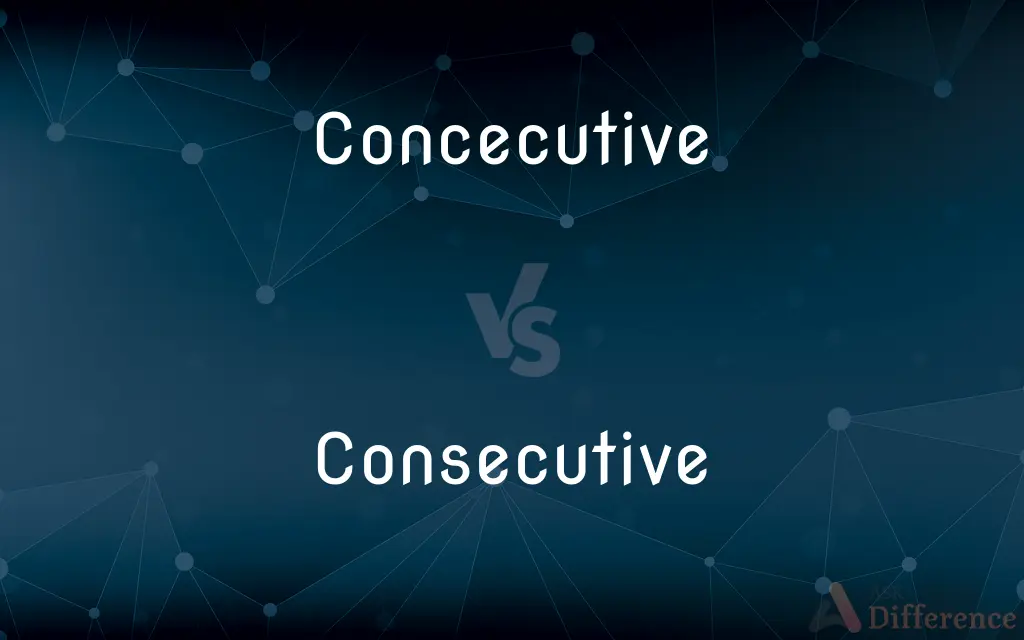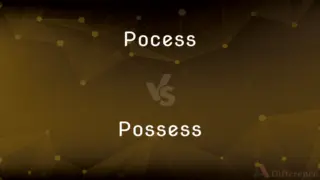Concecutive vs. Consecutive — Which is Correct Spelling?
By Tayyaba Rehman — Updated on April 2, 2024
Concecutive is an incorrect spelling. The correct spelling is "consecutive," which means "following in order."

Table of Contents
Which is correct: Concecutive or Consecutive
How to spell Consecutive?

Concecutive
Incorrect Spelling

Consecutive
Correct Spelling
ADVERTISEMENT
Key Differences
Use mnemonics: "Consecutive days have a SECure sequence."
"Consecutive" contains "sec": Think of "second" as in order or sequence to remember "sec."
Count the syllables: "Consecutive" has four syllables, while "Concecutive" only seems to have three.
"Con" + "sec": Break it down; think "with sequence" or "following sequence."
Remember "sequence": "Consecutive" is related to "sequence," meaning a set order, which can help recall its spelling.
ADVERTISEMENT
How Do You Spell Consecutive Correctly?
Incorrect: The movie marathon included seven concecutive films from the series.
Correct: The movie marathon included seven consecutive films from the series.
Incorrect: She worked for thirty-six concecutive hours to finish the project.
Correct: She worked for thirty-six consecutive hours to finish the project.
Incorrect: We've had rain for five concecutive days now.
Correct: We've had rain for five consecutive days now.
Incorrect: He won the championship for three concecutive years.
Correct: He won the championship for three consecutive years.
Incorrect: The team has lost four concecutive games this season.
Correct: The team has lost four consecutive games this season.
Consecutive Definitions
Relating to or denoting intervals of the same kind occurring without variation between them.
There were four consecutive numbers in the lottery.
Sequential; being in a constant sequence.
He gave three consecutive correct answers.
Successive; subsequent without interruption.
They won three consecutive matches.
Following one right after the other.
It rained on two consecutive weekends.
Following one after another without interruption; successive
Was absent on three consecutive days.
Won five consecutive games on the road.
Marked by logical sequence.
(Grammar) Expressing consequence or result
A consecutive clause.
Following, in succession, without interruption
Having some logical sequence
A sequence of notes or chords that results from repeated shifts in pitch of the same interval.
A linguistic form that implies or describes an event that follows temporally from another.
Consecutive interpretation.
Following in a train; succeeding one another in a regular order; successive; uninterrupted in course or succession; with no interval or break; as, fifty consecutive years.
Following as a consequence or result; actually or logically dependent; consequential; succeeding.
The actions of a man consecutive to volition.
Having similarity of sequence; - said of certain parallel progressions of two parts in a piece of harmony; as, consecutive fifths, or consecutive octaves, which are forbidden.
In regular succession without gaps;
Serial concerts
Successive (without a break);
Sick for five straight days
One after the other;
Back-to-back home runs
In a consecutive manner;
We numbered the papers consecutively
Following continuously in unbroken or logical order.
She worked for five consecutive days.
Consecutive Meaning in a Sentence
They celebrated their anniversary by taking consecutive trips to different countries each year.
The scientist recorded data at the same time for thirty consecutive days.
To master the skill, you need to practice for several consecutive days.
The company reported growth for eight consecutive quarters.
The temperature has risen over the past four consecutive days.
The athlete set a new record by winning five consecutive Olympic gold medals.
He was amazed to find that he had correctly guessed the coin flip ten consecutive times.
The driver faced heavy traffic for three consecutive mornings on her way to work.
For consecutive holiday seasons, they've volunteered at the local shelter.
The novel was on the bestseller list for twenty consecutive weeks.
The team is aiming for their third consecutive win to secure the championship title.
They noticed an increase in customer complaints for three consecutive months, prompting a review of service policies.
The meetings were scheduled on consecutive days to expedite the decision-making process.
The movie series is best watched in consecutive order to understand the storyline.
The student attended every lecture for the entire semester, never missing one for seven consecutive weeks.
To win the game, the player must collect items in consecutive order.
The town has celebrated the festival on the same date for fifty consecutive years.
She completed the puzzle without interruption over two consecutive nights.
The team's consecutive victories led them to the championship game.
He read the entire book series in consecutive order without skipping any.
He was late for work five consecutive days, which led to a serious warning from his employer.
The restaurant has passed its health inspection for ten consecutive years.
They've managed to save money for twelve consecutive months.
The museum has featured new artists for six consecutive months.
They experienced rainfall for consecutive days, leading to flooding in the area.
Common Curiosities
Which vowel is used before Consecutive?
It depends on the context of the sentence. No specific vowel always precedes "consecutive."
What is the pronunciation of Consecutive?
It's pronounced as /kənˈsɛk.jə.tɪv/.
Which preposition is used with Consecutive?
"For" can be used, as in "for three consecutive days."
Why is it called Consecutive?
It derives from Latin "consecutivus," meaning "following," which indicates a sequence.
What is the verb form of Consecutive?
"Consecutive" is an adjective. A related verb might be "to follow" or "to succeed."
What is the root word of Consecutive?
The root is "consequi," a Latin verb meaning "to follow."
What is the singular form of Consecutive?
"Consecutive" is an adjective and does not have singular or plural forms in the traditional sense.
Is Consecutive an abstract noun?
No, it's an adjective.
Is Consecutive a noun or adjective?
Adjective.
Is Consecutive a negative or positive word?
Neutral. It describes order or sequence.
What is the plural form of Consecutive?
"Consecutive" doesn't change form when used with plural nouns.
Which conjunction is used with Consecutive?
No specific conjunction is always paired with "consecutive"; it depends on the context.
Which article is used with Consecutive?
Both "a" and "the" can be used depending on the context.
Is Consecutive a countable noun?
No, it's an adjective.
What is the stressed syllable in Consecutive?
The second syllable: "sec."
What is another term for Consecutive?
Successive.
Is Consecutive an adverb?
No.
Is the word Consecutive imperative?
No.
What is the opposite of Consecutive?
Non-consecutive or intermittent.
Is Consecutive a collective noun?
No, it's an adjective.
Is the Consecutive term a metaphor?
No, it's used literally.
Is the word “Consecutive” a Direct object or an Indirect object?
"Consecutive" is an adjective and doesn't function as an object.
How many syllables are in Consecutive?
Four.
What part of speech is Consecutive?
Adjective.
What is the first form of Consecutive?
"Consecutive" is an adjective and doesn't have verb forms.
What is the third form of Consecutive?
"Consecutive" doesn't have verb forms.
How is Consecutive used in a sentence?
Example: "He won the race for three consecutive years."
Is Consecutive a vowel or consonant?
"Consecutive" is a word, not a single letter, so it's neither a vowel nor a consonant.
Is the word Consecutive a gerund?
No.
What is the second form of Consecutive?
"Consecutive" doesn't have verb forms.
How do we divide Consecutive into syllables?
Con-sec-u-tive.
Which determiner is used with Consecutive?
Determiners like "three" can be used, as in "three consecutive days."
Share Your Discovery

Previous Comparison
Enrollement vs. Enrollment
Next Comparison
Pocess vs. PossessAuthor Spotlight
Written by
Tayyaba RehmanTayyaba Rehman is a distinguished writer, currently serving as a primary contributor to askdifference.com. As a researcher in semantics and etymology, Tayyaba's passion for the complexity of languages and their distinctions has found a perfect home on the platform. Tayyaba delves into the intricacies of language, distinguishing between commonly confused words and phrases, thereby providing clarity for readers worldwide.


































